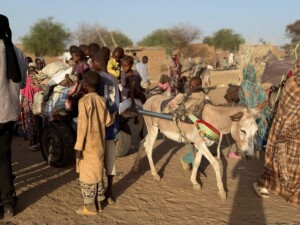Hemeti calls on eastern Sudan tribes to ‘unite for the greater good’
Gen Mohamed ‘Hemeti’ Dagalo, Vice-President of Sudan’s Sovereignty Council, has ended a five-day visit to Red Sea state, which he described as “successful and fruitful,” during which he “reviewed all the shortcomings in the Red Sea ports”, and that a matrix has been developed to address the issues at the seaports.
 Gen Mohamed ‘Hemeti’ Dagalo, Vice-President of Sudan’s Sovereignty Council, speaks during a five-day visit to Red Sea state (Photo: SUNA)
Gen Mohamed ‘Hemeti’ Dagalo, Vice-President of Sudan’s Sovereignty Council, speaks during a five-day visit to Red Sea state (Photo: SUNA)
Gen Mohamed ‘Hemeti’ Dagalo, Vice-President of Sudan’s Sovereignty Council, has ended a five-day visit to Red Sea state, which he described as “successful and fruitful,” during which he “reviewed all the shortcomings in the Red Sea ports”, and that a matrix has been developed to address the issues at the seaports.
In a press statement at the Secretariat General of the Red Sea state government on Saturday, Hemeti said that a matrix has been developed to address the shortcomings and obstacles at the seaports, the official Sudan News Agency (SUNA) reports. He also said that a time limit for the matrix will be set, besides specifying tasks and responsibilities, and the implementing organs.
Hemeti indicated that, during the visit, a memorandum of understanding was signed with the chambers of commerce who represent all the states of Sudan to develop, rehabilitate and improve the work of seaports.
The Vice-President of the Sovereignty Council stressed the importance of fighting corruption in the ports, noting that “acts of sabotage, disruption of machinery, and reduction of the exports were deliberately carried out”.
Hemeti stressed that the implementation of the decisions of this matrix will be permanently monitored, affirming the importance of sincerity in work, providing an appropriate work environment for the employees in the seaports, as well as combating injustice and discrimination in the container search, which causes great damage to a large part of clients.
Water
On the issue of water in the Red Sea state, Hemeti pointed out that the Economic Committee viewed that the solution of this problem comes through three axes, the first stage is emergency by establishing 10 desalinated water stations that are distributed in the localities of the state according to priorities, as they will be financed by the Ministries of Finance, Transport and Petroleum in addition to the Customs Administration and any other revenue authority that can help in this regard, while the second stage is a medium one and the third stage is a long-term, in which water will be brought from Atbara River, according to the possibilities.
The Vice-President of the Transitional Sovereignty Council stated that the seaports will not be closed by the native administrations again, after reaching an agreement with them that led to reconciliations between their leaders, praising the position of the chieftain Tirik and the leaders of other tribes.
Beja tribes
On Friday, Hemeti called on all the Beja tribes in general “to unite the ranks and raise the national spirit for progress of the country”. During an address to often restive Beni Amer and El Habab youth in Dar Beni Amer on Friday, Hemeti asserted the need “to forget the past and consider the greater good for the coexistence of all tribes of eastern Sudan”.
Protest
Tuesday witnessed demonstrations against the visit of Hemeti. The protestors blocked a number of streets with stones and tyres in central Port Sudan.
Demonstrators told Radio Dabanga that the police fired tear gas extensively and used excessive violence at the University Street and inside and outside the university campus, which led to a fire in one of the buildings.
Emirates partnerships
As previously reported by Radio Dabanga, Sudan’s Acting Foreign Minister, Ali El Sadig, says an agreement designed to enable banks to perform their role in the development of Sudan’s economy, has been negotiated between Sudan, the United Arab Emirates (UAE), and the private sectors.
El Sadig was speaking at Khartoum airport on Sunday the return from the UAE of a high-level delegation, headed by the Chairman of the Sovereignty Council, Gen Abdelfattah El Burhan.
He said that the Sudanese and Emirati delegations “agreed to establish large strategic economic partnerships in roads, ports, railway, military cooperation, and exchange of experiences”.
Workers at the sea ports in Red Sea state expressed their concerns about the privatisation of the Port Sudan port following the agreement between El Burhan and the Abu Dhabi’s heir apparent, on partnership in the field of sea ports.
Sea ports workers leader Osman Taher told Radio Dabanga that the UAE ports are a major competitor to the Red Sea ports and therefore cannot partner. He expressed the workers concerns over the port of Port Sudan. The agreement with Abu Dhabi may lead to the closure of the Port Sudan port in favour of the UAE ports.
He pointed to the high shipping cost from global ports to Port Sudan of $12,000 for a container compared to $8,000 to the Egyptian ports, and said that shipping companies as well expect the closure of the Port Sudan port.
Sources: SUNA / RD











 and then
and then